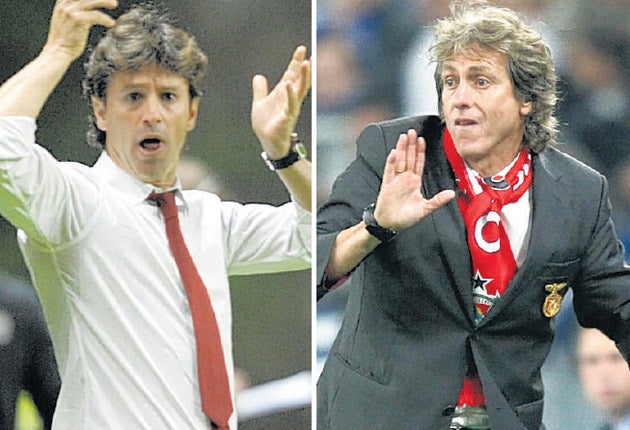Crisis? What crisis? Debt-ridden Portugal profits from Europa League
Having Porto, Benfica and Braga all in tonight's semi-finals is a welcome distraction from economic woes

Your support helps us to tell the story
From reproductive rights to climate change to Big Tech, The Independent is on the ground when the story is developing. Whether it's investigating the financials of Elon Musk's pro-Trump PAC or producing our latest documentary, 'The A Word', which shines a light on the American women fighting for reproductive rights, we know how important it is to parse out the facts from the messaging.
At such a critical moment in US history, we need reporters on the ground. Your donation allows us to keep sending journalists to speak to both sides of the story.
The Independent is trusted by Americans across the entire political spectrum. And unlike many other quality news outlets, we choose not to lock Americans out of our reporting and analysis with paywalls. We believe quality journalism should be available to everyone, paid for by those who can afford it.
Your support makes all the difference.Monday's annual commemorations of the 1974 revolution in Portugal were low-key, befitting the sombre mood of a country drifting through troubled waters. With caretaker-prime minister Jose Socrates negotiating with the IMF with curtailed powers following his resignation from full office, an apprehensive nation is watching 24-hour news through its fingers as a seemingly bleak future unfolds.
So the historic presence of the country's current top three football clubs – Porto, Benfica and Braga – in the semi-finals of the Europa League is a rare ray of sunshine. "There's no crisis here," blared the headline on Portuguese sports daily Record after the trio's qualification for the last four. It may be a mere placebo, but it is a very welcome one.
Whatever the nation's political trials, there is little questioning of the strength of leadership at the country's top clubs. Title-winning Porto's coach Andre Villas-Boas was gobbling up column inches across Europe even before his side's demolition of Spartak Moscow in the quarter-finals. "The games against Spartak opened our eyes," said Nilmar, semi-final opponents Villarreal's Brazilian striker.
Benfica and Braga, who meet in tonight's other semi-final first leg, are steered by similarly magnetic personalities, as the promising current crop of Portuguese coaches step forward in the post-Mourinho era. Benfica's supremely confident Jorge Jesus referred to himself as the "Special Two" as his side swept to the title last season. Braga's Domingos Paciencia is set to go head-to-head with Jesus in Lisbon next season as the next coach of Sporting, following in the footsteps of Sir Bobby Robson, under whom he starred as a centre-forward for the former England coach's Porto side in the mid-1990s.
Yet appearances can be deceptive. This all-Portuguese encounter mirrors the country's general anxiety more than may appear at first glance. This is especially the case on Benfica's side, with Jesus' habitually bombastic rhetoric becoming more circumspect in recent weeks.
Benfica were beaten twice at their own Estadio da Luz by arch-rivals Porto in the space of 17 days, first to snatch away their league crown and then to dump them out of the Portuguese Cup semi-final.
As Benfica finally lifted silverware on Saturday night, winning the league cup against Paços de Ferreira, it was clear just how difficult this has been to take. Modest celebrations took a turn for the worse when captain Luisao threw his shirt to fans at the end of the game, only for it to be launched straight back. Top scorer Oscar Cardozo, having notched just three (all penalties) in his past 10 games, was whistled by supporters.
If Jesus has been stuck for answers, it is hard not to feel sympathy. For the second successive season Benfica have topped the 100-goal mark in all competitions – 105 after 51 games – but they have simply been victims of Porto's inexorable pace.
Only an end to their 49-year European trophy drought – since Eusébio and Mario Coluna fired them to the 1962 European Cup – will make the season a success.
Less is expected of Braga, as has been the case throughout an astonishing European campaign, which began in the Champions League qualifying rounds against Celtic back in July, and has since taken in wins over Arsenal and Liverpool. The club goes into the first leg at Estadio da Luz having won just once at Benfica in its entire history, back in 1954-55 when the squad celebrated with 2kg of prawns and 50 bottles of beer, offered in lieu of late wages.
Domingos has assembled his Braga side on a shoestring, composed of journeyman Brazilians such as Paulao and Artur, and the likes of Alan and Hugo Viana, cast-offs from bigger clubs. They are already the winners in financial terms, having raked in €13.43m (£11.9m) – before counting gate receipts and TV rights – against Benfica's €10.4m, figures which dwarf Porto's modest €3.46m culled exclusively from a rare season in the Europa League.
"It's amazing that Portugal can be living through such a crisis yet be in the limelight of European football in this way," the Panathinaikos coach Jesualdo Ferreira, who has managed all three Portuguese semi-finalists in the past decade, told sports paper O Jogo this week. "People who love football, whichever club they support, have to value this."
Whether that philosophy will hold over two legs between Jesus' and Domingos' sides is debatable. Benfica's loss at Braga in March, where their midfielder Javi Garcia was sent off and Cardozo pelted with golf balls by home fans, virtually ended their reign as champions. In last season's meetings, Braga's Mossoro broke his leg at the Luz following a tunnel punch-up at Braga's Estadio Municipal earlier in the campaign. Whatever this tie in particular means to Portugal at large, it will be every man for himself over the next week.
Join our commenting forum
Join thought-provoking conversations, follow other Independent readers and see their replies
Comments